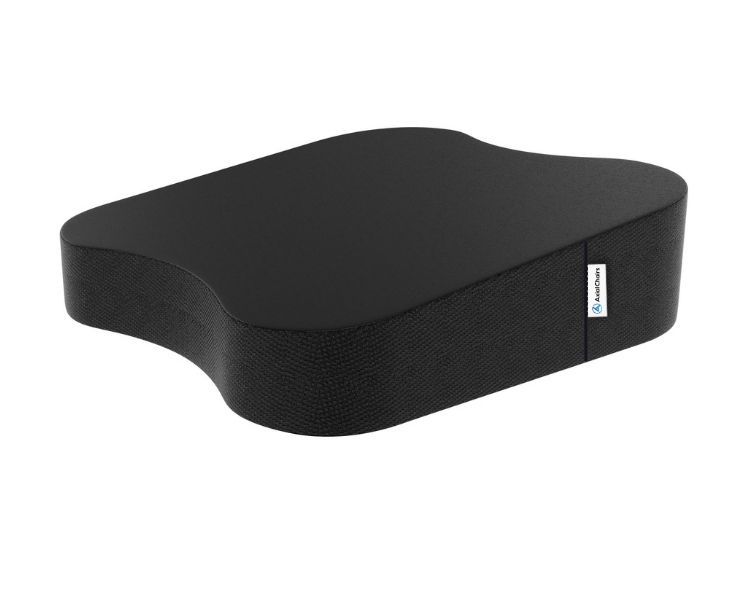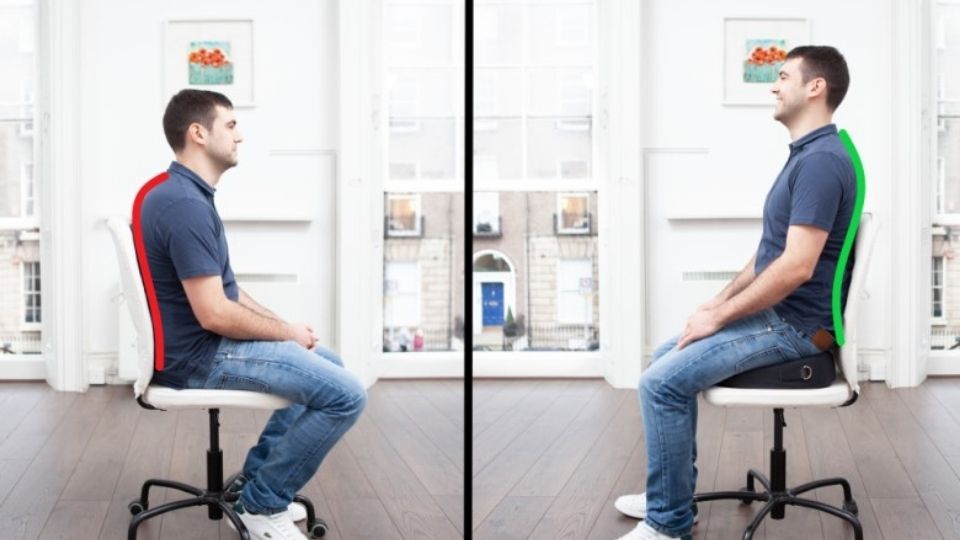As a physician, one of the most common questions I get from my patients is “How can I relieve back pain?” While there are many potential causes for back pain, being in an uncomfortable sitting position often exacerbates this issue. Fortunately, there are certain seated positions that may be beneficial in relieving back pain. In this blog post, we will explore the different types of body positions and the corresponding effects they have on your wellbeing. By understanding what works best for you, it can help to reduce or even prevent future discomfort.
As a general rule, to ensure the best sitting position for back pain support and comfort is obtained with chairs with multiple adjustable features, such as seat height and depth, forward tilt, armrests, headrests, and lumbar support. The seat material must provide adequate support for the lower back, which encourages good posture and reduces fatigue.
Back pain when sitting is a common issue that affects many office workers. As someone who has been practicing chiropractic for over three decades and also trained as an ergonomist, I have the knowledge and experience needed to help alleviate this problem. I have written a book on posture, appeared on national TV to discuss this topic, a YouTube channel on this subject, and developed products to help people improve their posture and comfort while sitting. I even successfully crowdfunded a project to create a set of ergonomic seat cushions. I am confident that I can steer you into the right direction.
Navigating the World of Ergonomics: 4 Key Features of a Back-Friendly Chair
Drawing from years of experience as a chiropractor and a long-standing advocate for spinal health, I’ve developed a deep understanding of the relationship between sitting and back pain. I’ve seen firsthand how a properly adjusted chair can alleviate back discomfort and promote healthier posture. Your spinal alignment and a balanced, strong core are the central mechanisms for sitting without causing back pain. So, let’s delve into the four crucial aspects of a chair design that can support these vital bodily functions: seat depth, seat height, forward tilt, and chair recline.
The Importance of Seat Depth
The depth of your chair plays an integral role in maintaining a neutral spine position while sitting. Too high, and you might find your thighs not comfortably resting, leading to added strain. With my clinical experience, I can tell you that a chair with an appropriate seat depth that doesn’t crowd your thighs and offers sufficient legroom can significantly alleviate this issue.
Getting Seat Height Right
The height of your seat is essential to prevent the dreaded lower back slouch, a common culprit for back problems. The seat should be sufficiently high to keep your lower back from collapsing forward while sitting. A chair that aligns with your thighs without causing undue pressure and provides ample legroom can mitigate the potential for back issues.
The Forward Tilt Factor
The forward tilt feature of your chair is critical for those wanting to keep chronic low-back pain at bay. This adjustment assists in correcting the instinctive slouching posture that your body assumes when seated for extended periods. By subtly tilting your hips forward, you can maintain a healthier spinal alignment. As a general rule of thumb, your hips should always be positioned higher than your knees, with some standards recommending up to 20° of forward lean. This helps to reduce pressure on your lower spine while promoting better posture. By optimizing seat angles, you can alleviate pressure points that may develop due to prolonged sitting, promoting healthier blood circulation.
I explain the concept of my ergonomic design on a TV show HERE
Best Seat Cushion for Back ComfortDoctor's Recommendation
Black Friday Offer!
Get 35% off Orthopedic Seat Cushion
Product DetailsResearch-based Design
Recommended ForBack Discomfort
Video Guide
Video Guide
Developing a Well-Supported Forward Tilt for Ergonomic Chair: Insights and Considerations
To effectively address your seating requirements, it’s imperative to examine multiple aspects, with chair tailoring being a vital part. Various strategies can be used for this, such as integrating an ergonomic cushion and lumbar support. These additions can diminish stress on your back and legs, enhancing comfort and posture during extended sitting periods. Moreover, verify that your feet are flat on the floor and that there’s sufficient space between your chair and table. By implementing these tips, any standard rigid chair can be turned into an ergonomic haven that encourages long-term health and well-being.
Ergonomic Comfort Cushion
A versatile ergonomic seat wedge (above) can be utilized to correctly align your spine and improve balance. This premium natural latex cushion assists in building core muscles while reducing tension in other sections, such as the neck and shoulders. Additionally, sitting upright is less strenuous on your hips and knees, as it engages more muscle groups collectively compared to reclining against something plush. This vertical posture prevents the formation of stress-inducing habits that people may unintentionally develop while working.
Best Seat Cushion for Back ComfortAxial Ergonomic Seat Cushion® | Seat Chair Wedge
Quick Guide: A 30-Second Summary

All Day Comfort & Support
Product Name
Axial Designs™ Seat Cushion
Price
$149
Warranty
1 Year
Type
Posture Wedge
Top Layer
100% Natural Latex (Molded)
Bottom Layer
High-Density Foam
Top Material
Isometric Grippy Vegan Leather
Bottom Material
Non-Slip Material
Side Material
3D Breathable Fabric
Chair Recline Flexibility
Lastly, consider the chair’s capacity to accommodate a range of postures, particularly reclining. Habitual leaning forward can exert excessive pressure on your spinal discs, often leading to back pain. An ideal chair allows for dynamic posturing through intermittent reclining, thus reducing strain on your back.
Black Friday: 35% Off Today
Typical Delivery 1-3 Days
As a point of clarification, while I appreciate the benefits of natural latex in seating, I neither endorse nor recommend specific products, memory foams, or gel foams. I believe that the best choice depends on individual needs and preferences. Please remember that while these recommendations can help enhance comfort and reduce back pain, they are not intended as a replacement for professional medical advice.
Best Sitting Position in Bed for Pain in Low Back | Posture Positions
Ah, the common dilemma of wanting to sit comfortably in bed without that pesky lower back pain nagging at you. I know how you feel. In my clinical experience, the best sitting position in bed for alleviating lower back pain involves strong back support, evenly distributing your weight across your hips. This could mean using a sturdy pillow for support, or even a foam wedge. You see, the key lies in maintaining spinal alignment and a balanced, strong core. That’s your recipe for sitting up straight, even when your mattress is tempting you to slouch.
Sitting Positions On Sofa to Relieve Lumbar Pain
You’d be surprised how many people come to me, a chiropractor, with the same complaint: “Doc, I can’t even sit on my sofa without feeling pain in my lower back!” It’s a common issue, but the solution could be simpler than you think. First, consider sitting up with both feet flat on the ground. This helps keep your spine in a neutral position. Make sure to use the backrest on your office chair or any chair for that matter, even when you’re at home. The goal is to relieve pain by maintaining a good sitting posture, no matter where you’re seated.
I’ve written a complete hands-on review about the best sitting position for sciatica, and here is what I tested best with my sciatica patients.
How to Sit With Lower Back Pain and Sciatica
I’ll tell you this, lower back pain and sciatica can be a tricky duo. But don’t worry, I’ve got a few tricks up my sleeve too. Try to sit up, distributing your weight evenly across your hips, and make sure your feet are flat on the ground. These sitting positions can help reduce the pressure on your sciatic nerve and consequently, your lower back pain.
How to Relieve Back Pain From Sitting | Mayo Clinic Guidelines
“I know how you feel,” I often tell my patients who visit with a grimace on their faces, clutching their lower back in pain. As a chiropractor, I see an influx of these cases, often from people who have a job that involves prolonged sitting. It’s an ache that digs deep and spreads from your lower back to your legs, making even the simplest movements a task. But here’s what I found out from my clinical experience – relief is possible, and I’m going to share with you how.
Now, you might be thinking about that “pain lower” moment when you’re at your desk, with the pain just starting to creep in. From my updated June guidelines, I’ve learned that it’s crucial to address the root cause of this pain. Often, it’s due to poor posture and lack of movement, leading to an imbalance in the spine and core strength. This is where spinal alignment and a strong, balanced core come into play.
Through my collaboration with the Mayo Clinic and MyHealth Alberta, I’ve come across the importance of these two factors in maintaining a healthy back. With Alberta’s focus on holistic health, they reinforce the idea that spinal alignment is not just about the back, but also about the overall health of your body. This is because a misaligned spine can lead to other complications, including leg pain, that can affect your overall quality of life.
As a chiropractor, I often advise my patients to watch the “video back” I’ve put together, which provides a visual guide to exercises that promote spinal alignment and core strength. These exercises not only relieve back pain but also prevent future episodes.
And when you’re in pain and wondering where to “find care”, I suggest looking for a professional who emphasizes not just symptom relief but also a holistic approach to health. It’s not just about finding care; it’s about the “care find” that makes all the difference, focusing on preventing issues before they start.
I recommend seeking a “family medicine” approach, where they look at your overall health and lifestyle, not just the isolated problem. Incorporating exercise and good posture habits into your daily routine, along with regular chiropractic care, can help you maintain a healthy back and ward off that debilitating lower back and leg pain.
In conclusion, sitting for prolonged periods can indeed be a pain in the back, but it doesn’t have to be. With proper spinal alignment, a strong and balanced core, and the right care, you can sit without discomfort and maintain a healthy, active lifestyle.
Exercises for Back From Sitting Too Much
Sitting too much can wreak havoc on your lower back. But don’t fret, there’s hope yet. From my clinical experience, and resources such as MyHealth Alberta and patient resources from the Mayo Clinic, I can recommend some effective exercises. These are designed to strengthen your core and improve your posture, thereby helping to relieve lower back pain.
Remember, the key to relieving lower back pain lies in maintaining a strong core and a properly aligned spine. By doing so, you can enjoy your favorite sitting positions, be it on your bed, sofa, or office chair, without the nagging pain. Always consult with a medical professional before starting a new exercise routine. This information has been medically reviewed to ensure its accuracy.
Summary
As noted, there are many adjustable features to consider when shopping for a back-supporting chair. Ultimately, by taking the time to find a comfortable and supportive seating solution that fits your body and supports your posture, you can experience lasting back pain relief. It is also important to take regular activity breaks throughout the day to get up, move around, stretch and relieve stress on your body. With proper selection of furniture and care for your posture, you can make small changes that will have a big impact for years to come. So take the wheel today and make strides towards healthier lifestyle habits that not only improve overall health but promote comfortability in your everyday life as well.






